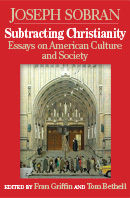The present volume, out last fall from the Fitzgerald Griffin Foundation, is as welcome as its predecessor, Joseph Sobran: The National Review Years, published in 2012. For the new collection, the editors have selected columns, articles, and essays drawn from across the spectrum of Sobran’s outlets, including the Universal Press Syndicate and Griffin Internet Syndicate, Sobran’s, The Wanderer, Celebrate Life!, and The Human Life Review. Among the topics covered here are John Milton, the operas of Verdi, Homer, and—of course—William Shakespeare. Overwhelmingly, however, and as the title suggests, the subject of this book is Christianity and its place in the contemporary world: a defense of Christian truth and an assertion of the terrible damage its “subtraction” from public awareness and discourse has inflicted on Western culture in modern times.
As every reader acquainted with the Sobran corpus will expect, there are many wonderful things here. Indeed, the book is full of them. On the Church-state question:
The Constitution merely forbids Congress to make any “law respecting an establishment of religion, or abridging the free exercise thereof.” This provision applies to Congress and can therefore be violated only by Congress, not by churches, even if they support particular candidates.
Of John Kerry’s attempt to reconcile his “carefully unspecified faith” (Kerry is a nominal Catholic) with his determination to avoid “imposing his religion on others”: “the grace of a man walking a tightrope while wearing skis.” On the charge that Catholicism is “out of step” with the modern world: “The whole purpose of a religion is to keep you out of step.” (This dictum has a Chestertonian ring to it.) On the welfare state: “We are now forced to support other people’s children and parents, while the taxes we pay to do so make it harder to support our own. Is it any wonder that the birthrate is lower and abortion is popular?” And, perhaps most wonderfully, on Chesterton’s way of bringing “a sense of the ludicrous to every error he refutes. If it’s wrong, it must also be funny. Humor, like light, is inherent in the nature of things.”
A working journalist—like an operatic tenor, a quarterback, or even a society call girl—cannot be on his game every day, not equally so anyway, and so this long (perhaps too long) book contains its share of relatively flat pieces among the 117 it includes. I remember as if it were the day before yesterday Joe’s pride upon being offered a twice-weekly column by Universal. Though I was pleased for him at the time, I have often thought since that, while the wider exposure a column allowed him and his work was, of course, a good thing, the transition from “M.J. Sobran” to “Joseph Sobran” (I suppose at the syndicate’s suggestion, or insistence) implied a change more fundamental than the new, less literary, byline suggested. Indeed, year by year, the elegantly literary (though always amusing and relaxed) essayist for The Human Life Review and National Review “evolved” (a word he hated, for all the obvious reasons) into the chatty columnist (which of course he was being paid to be) whose work adumbrated the blog of today, then still a couple of decades in the future. Sobran’s followers in the papers loved it; so did many of his long-standing admirers from the 1970’s, who nevertheless remembered his dashing high literary style, which, though formed by his acquaintance with the great English essayists, was still quintessentially American (a description that also applies to Mencken’s writing). A good deal of the change, obviously, was attributable to the restrictions imposed by the new genre he was working in, the 800-word limitation especially. Perhaps because as a columnist he was held to a length that made developed exposition of an idea difficult, the writing of “Joseph Sobran” became increasingly personal. Unfortunately, the personal approach left him increasingly susceptible to the sentimental streak, bordering at times on smugness and even smarminess, that was one facet of his personality, especially when he was dealing with religious subjects. For a great many of his readers this was part of his charm, and who is to say they were wrong? It is a matter of taste, after all. Still, I preferred the more formal, high-toned style of M.J. Sobran’s work in the 70’s, a specimen of which—“On Imposing One’s Views”—is reprinted here from the Spring 1979 number of The Human Life Review.
Joe Sobran was never a man of ideas, in both the positive and the negative sense. (This helps explain why he wrote only one “real” book, as distinct from essay collections: Alias Shakespeare, which argues that the author of the plays we attribute to the Bard was really Edward de Vere, 17th Earl of Oxford.) He was a brilliant commentator on other people’s ideas, their worst ideas especially, and a deadly deflator of them and their purveyors equally, though always a fair and good-natured one—even when his target was Garry Wills. He was a counterpuncher, and nobody ever delivered swifter, more accurate, and more devastating blows. So good was he at his work indeed that he came close to inventing a genre of his own, which goes a long way to account for his immense popularity among people who agreed with his views and appreciated his wit.
M.J. Sobran was a celebrity in the pitifully shrunken moral and imaginative world in which he functioned as an artist. Had that world been expanded to its rightful proportions, he would have been—would be—among the best-known writers of his day. Subtracting Christianity is only the most recent volume to substantiate that claim.
[Subtracting Christianity: Essays on American Culture and Society, by Joseph Sobran
edited by Fran Griffin and Tom Bethell (Vienna, VA: FGF Books) 422 pp., $27.00]

Leave a Reply